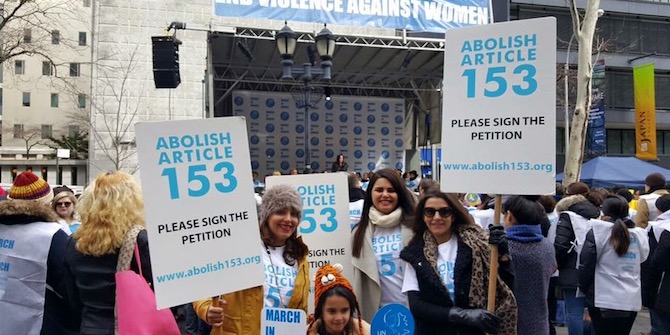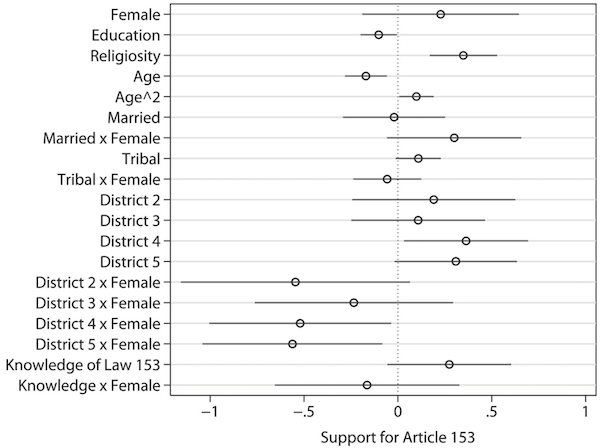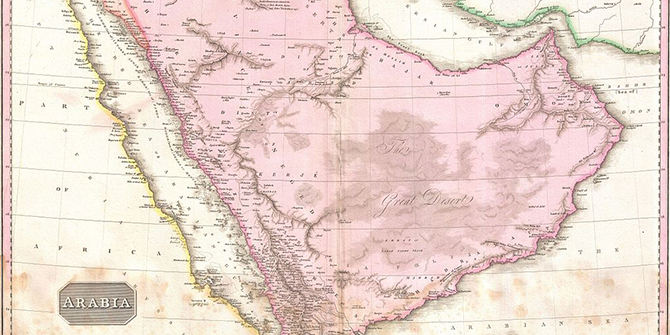by Justin Gengler

Overview
Article 153 is a provision of Kuwait’s penal code that offers a vastly reduced sentence to the perpetrator of an honour crime – that is, a man who commits a violent act, including murder, upon surprising his immediate female kin in an unsavoury sexual act (zina). The law states that murder in such a case is to be treated as a misdemeanour, carrying a maximum sentence of 3 years jail time and/or a fine of 3,000 rupees (KD 14). It applies equally to the murder of the accused woman as well as that of the man caught with her. In effect, by removing expectations of serious punitive or financial consequences for the male relative, Article 153 all but legalises honour killing.
In July 2016, a nationally-representative public opinion survey[1] was undertaken to better understand Kuwaitis’ knowledge of and attitudes toward domestic violence and honour killing in general, and Article 153 in particular. A survey pre-test revealed public knowledge of Article 153 to be very low: as few as 5 percent of respondents indicated that they knew of the specific law. Therefore, the final survey avoided explicit reference to the Article itself, asking citizens instead about the particular case it deals with, namely physical violence against a woman caught in the act of adultery. For simplicity and due to length restrictions, the survey did not ask about attitudes related to the punishment of the male companion. Moreover, to avoid ambiguity in respondents’ interpretation of questions, the survey asked about ‘a law legalising physical violence against a woman caught in the act of adultery,’ rather than ‘a law stipulating a reduced sentence in the case of physical violence …’.
The survey asked about a range of topics related directly and indirectly to Article 153. These include:
- views about the problem of domestic violence relative to other social issues;
- attitudes toward women;
- views about violence against women in the case of adultery;
- support for a law permitting violence against women in the case of adultery;
- general interest and involvement in politics; and
- voting
In addition, the survey collected relevant demographic data on respondents that could help explain variation in attitudes. These data include gender, age, education, marital status, economic status, religiosity, tribal orientation, and geographical region.
Summary of Survey Results
The survey reveals a Kuwaiti citizenry that is overwhelmingly unaware of the existence of Article 153, equally divided over the justifiability of violence against a woman caught committing adultery, and generally unsupportive of a law that would permit such violence:
- Only 14% of Kuwaitis, both men and women, know that Article 153
- Exactly half of Kuwaitis – 51% of Kuwaiti men and 50% of Kuwaiti women – agree with the statement, ‘It is justified to use violence against a woman who has committed adultery.’
- Around one-third of Kuwaitis – 35% of men and 40% of women – support ‘[a] law legalising physical violence against a woman caught in the act of adultery.’
- Attitudes toward violence against women in Kuwait are strongly related to respondents’ demographic attributes, especially religiosity and tribal orientation.
Explaining Public Support for Article 153
As noted, the survey also gathered data on demographic and other respondent characteristics that might help account for variation in support for Article 153. Variation by gender had already been considered, but other relevant factors captured in the survey include respondent age, education, marital status, economic status, religiosity, tribal orientation, and geographical region of residence.
Figure 1 depicts the independent effects of these and other variables on support for Article 153, as estimated via ordinary (a standard analysis to generate statistics). The regression model includes eight independent variables – gender, education, religiosity, age, marital status, tribal orientation, district of residence, and awareness of Article 153 – along with multiplicative interaction terms to test for gender-based differences in effects.
As shown in Figure 1, the single greatest predictor of support for Article 153 is religiosity: more religious Kuwaitis are far more likely to express their support for a law like Article 153 than non-religious men and women. Other significant positive predictors are tribal orientation (among males), marital status (among females), knowledge of Article 153 (among males), and being a resident of electoral District 4 or 5 (among males). In addition, females living in voting District 1 are more likely to support Article 153 than females elsewhere in Kuwait, while education level is negatively related to support for the Article among all citizens.
Finally, respondent age is not related to support for Article 153 in a straightforward fashion. For men, support is highest among younger Kuwaitis and gradually declines with age, although the magnitude and statistical significance of this effect among men is slight. For Kuwaiti women, by contrast, support is estimated to be high among the youngest and oldest adults but is considerably lower among those of middle age. This indicates, notably and perhaps surprisingly, that the youngest generation of Kuwaitis, and especially women, do not necessarily possess more positive gender attitudes than their parents. Moreover, the observed u-shaped relationship among females suggests that acceptance of gender violence decreases as Kuwaiti women gain first-hand experience with marital relations and as they come to have sons and daughters of their own.



Notes
[1] The survey was conducted by telephone and includes a total of 1,050 citizen respondents. Respondents were selected at random by random digit dialling from a comprehensive national frame, and were asked to confirm that they were Kuwaiti citizens aged 21 (voting age) or above. The survey was carried out by a professional and reputable data collection firm based in Kuwait.
This is an edited selection of research conducted for Abolish153, a summary of which which can be accessed here.
 Justin Gengler is Research Program Manager at the Social and Economic Survey Research Institute (SESRI) at Qatar University, where he heads the SESRI Policy Unit. He is the author most recently of Group Conflict and Political Mobilization in Bahrain and the Arab Gulf: Rethinking the Rentier State (Indiana University Press, 2015). He tweets at @JustinJGengler
Justin Gengler is Research Program Manager at the Social and Economic Survey Research Institute (SESRI) at Qatar University, where he heads the SESRI Policy Unit. He is the author most recently of Group Conflict and Political Mobilization in Bahrain and the Arab Gulf: Rethinking the Rentier State (Indiana University Press, 2015). He tweets at @JustinJGengler
In this series:
- Introduction by Courtney Freer
- Is Female Suffrage in the Gulf Important? by Hatoon Al-Fassi
- Saudi Women: Navigating War and Market by Madawi Al-Rasheed
- Disciplinary Violence in Kuwait by Alanoud Alsharekh
- The Influence of Islamist Rhetoric on Women’s Rights by Courtney Freer
- Gender equality in Iraq and Iraqi Kurdistan by Zeynep Kaya
- Sexual Violence against Women during Displacement by Zeina Awad
- Women’s Access to Justice for Gender-Based Violence in Universal and Regional Human Rights Law by Lisa Gormley
- Assessing the Role of Security Forces on Women in Conflict Zones: Perspectives from International Law by Antonia Mulvey







4 Comments